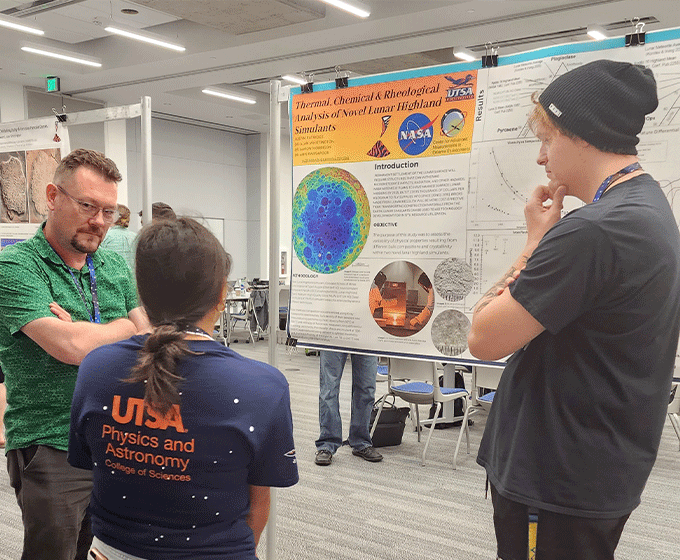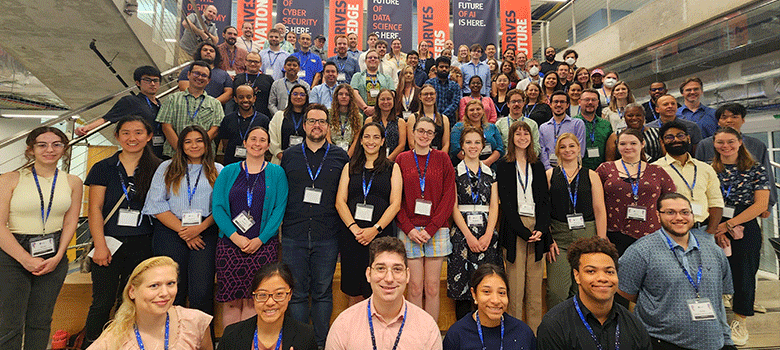
AUGUST 15, 2024 — About 100 of Texas’ planetary scientists will once again gather at UTSA San Pedro I for the second annual Texas Area Planetary Science (TAPS) meeting on Thursday, August 15, and Friday, August 16.
The TAPS meeting aims to strengthen interactions within the Texas planetary-exoplanet science and astrobiology community and foster collaborations and partnerships between institutions and researchers.
Xinting Yu, assistant professor in the UTSA Department of Physics and Astronomy, created the TAPS meeting during her first year at UTSA to cultivate a space for collaboration while solidifying UTSA as a leading hub in space research.

The TAPS meeting brought several univesrities together to share their research..
“We’re covering topics that range from planets in the solar system to the Artemis mission and sending humans to the moon,” Yu said. “It’s a time to have conversations that we hope keep going and help people find new collaborations.”
The inaugural meeting broke down barriers between young researchers and established faculty, Yu further expressed.
At this year’s TAPS meeting two NASA representatives will serve as keynote speakers and will share information about future space missions.
Kenna Lynch, an astrobiologist and program specialist in exploration science at NASA’s headquarters in Washington, D.C., will discuss the Artemis mission, which will send four astronauts around the Moon to establish human exploration of the lunar planet.
Julie Crooke, program executive for the Habitable Worlds Observatory, will introduce students and researchers to NASA’s next generation, big telescope project. The Habitable Worlds Observatory (HWO) follows the success of the James Webb Space Telescope (JWST). The observatory’s goals are to search for signs of life on potentially habitable exoplanets and to pursue a broader understanding of the cosmic frontiers in the coming decades.
“It’s great seeing that UTSA has become the focal point to space research because it shows the local, state and national collaboration,” said Chris Packham, professor of astrophysics in the UTSA Department of Physics and Astronomy. “We’re also encouraging national representatives to come and talk about the next generation telescopes, such as the Habitable Worlds Observatory. Our students and researchers could really help play an important role in defining and perhaps using this telescope. This is the nucleation point here. It’s the right time and the right place.”
UTSA will host researchers from participating institutions that include Southwest Research Institute, the Lunar and Planetary Institute, University of Texas at Austin, Texas A&M University, the University of Houston, Trinity University, Rice University, University of Texas Rio Grande Valley and Baylor University.
UTSA faculty have made significant contributions to space sciences research in recent years. In 2023, UTSA astrophysicists partnered with the Subaru Telescope and the European Space Agency to capture one of the first-ever images of an exoplanet seen by the JWST. That same year, NASA recognized Yu with a Planetary Science Early Career Award to establish a Planetary Material Characterization Facility.
In 2022, UTSA astronomers played a pivotal role in the Event Horizon Telescope project, contributing to the first-ever image of black hole Sagittarius A*. UTSA faculty have also partnered on several NASA-funded small business innovation and technology transfer projects.
UTSA Today is produced by University Communications and Marketing, the official news source of The University of Texas at San Antonio. Send your feedback to news@utsa.edu. Keep up-to-date on UTSA news by visiting UTSA Today. Connect with UTSA online at Facebook, Twitter, Youtube and Instagram.
Move In To COLFA is strongly recommended for new students in COLFA. It gives you the chance to learn about the Student Success Center, campus resources and meet new friends!
Academic Classroom: Lecture Hall (MH 2.01.10,) McKinney Humanities BldgWe invite you to join us for Birds Up! Downtown, an exciting welcome back event designed to connect students with the different departments at the Downtown Campus. Students will have the opportunity to learn about some of the departments on campus, gain access to different resources, and collect some giveaways!
Bill Miller PlazaCome and celebrate this year's homecoming at the Downtown Campus with food, games, giveaways, music, and more. We look forward to seeing your Roadrunner Spirit!
Bill Miller PlazaThe University of Texas at San Antonio is dedicated to the advancement of knowledge through research and discovery, teaching and learning, community engagement and public service. As an institution of access and excellence, UTSA embraces multicultural traditions and serves as a center for intellectual and creative resources as well as a catalyst for socioeconomic development and the commercialization of intellectual property - for Texas, the nation and the world.
To be a premier public research university, providing access to educational excellence and preparing citizen leaders for the global environment.
We encourage an environment of dialogue and discovery, where integrity, excellence, respect, collaboration and innovation are fostered.